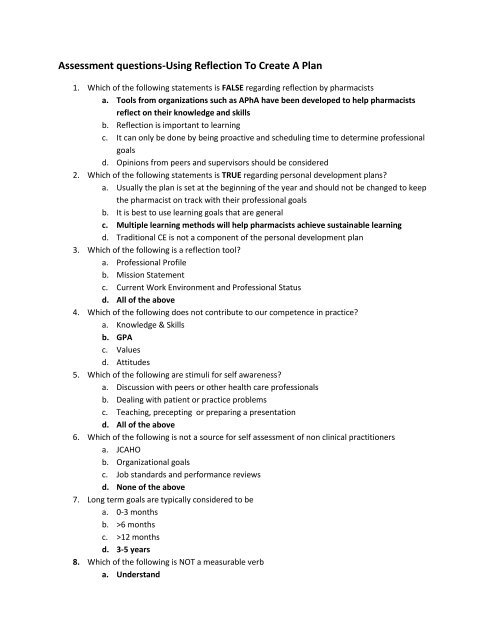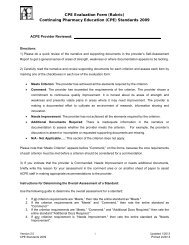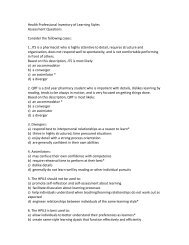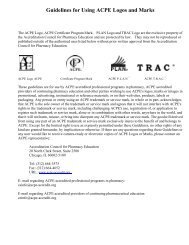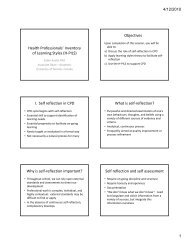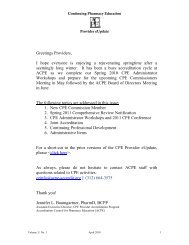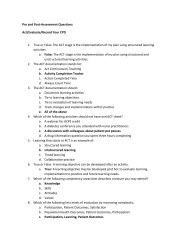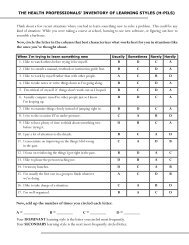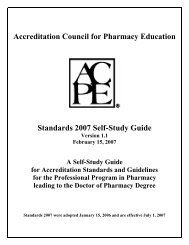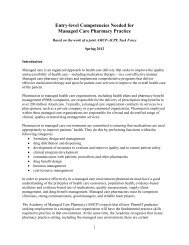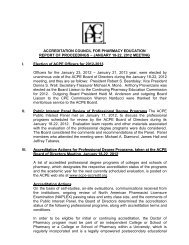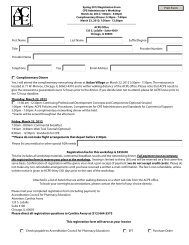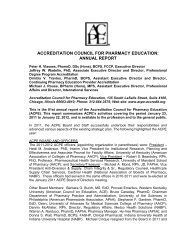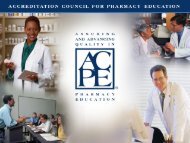Assessment questions-Using Reflection To Create A Plan
Assessment questions-Using Reflection To Create A Plan
Assessment questions-Using Reflection To Create A Plan
You also want an ePaper? Increase the reach of your titles
YUMPU automatically turns print PDFs into web optimized ePapers that Google loves.
<strong>Assessment</strong> <strong>questions</strong>-<strong>Using</strong> <strong>Reflection</strong> <strong>To</strong> <strong>Create</strong> A <strong>Plan</strong><br />
1. Which of the following statements is FALSE regarding reflection by pharmacists<br />
a. <strong>To</strong>ols from organizations such as APhA have been developed to help pharmacists<br />
reflect on their knowledge and skills<br />
b. <strong>Reflection</strong> is important to learning<br />
c. It can only be done by being proactive and scheduling time to determine professional<br />
goals<br />
d. Opinions from peers and supervisors should be considered<br />
2. Which of the following statements is TRUE regarding personal development plans?<br />
a. Usually the plan is set at the beginning of the year and should not be changed to keep<br />
the pharmacist on track with their professional goals<br />
b. It is best to use learning goals that are general<br />
c. Multiple learning methods will help pharmacists achieve sustainable learning<br />
d. Traditional CE is not a component of the personal development plan<br />
3. Which of the following is a reflection tool?<br />
a. Professional Profile<br />
b. Mission Statement<br />
c. Current Work Environment and Professional Status<br />
d. All of the above<br />
4. Which of the following does not contribute to our competence in practice?<br />
a. Knowledge & Skills<br />
b. GPA<br />
c. Values<br />
d. Attitudes<br />
5. Which of the following are stimuli for self awareness?<br />
a. Discussion with peers or other health care professionals<br />
b. Dealing with patient or practice problems<br />
c. Teaching, precepting or preparing a presentation<br />
d. All of the above<br />
6. Which of the following is not a source for self assessment of non clinical practitioners<br />
a. JCAHO<br />
b. Organizational goals<br />
c. Job standards and performance reviews<br />
d. None of the above<br />
7. Long term goals are typically considered to be<br />
a. 0-3 months<br />
b. >6 months<br />
c. >12 months<br />
d. 3-5 years<br />
8. Which of the following is NOT a measurable verb<br />
a. Understand
. Identify<br />
c. List<br />
d. Explain<br />
9. Which of the following is a measurable verb<br />
a. Propose<br />
b. Apply<br />
c. Describe<br />
d. All of the above<br />
10. Which of the following is an example of a SMART objective?<br />
a. List antivirals and their use in seasonal and H1N1 flu by September<br />
b. Compare and contrast antivirals by May 2010<br />
c. Know antivirals by September 2010<br />
d. Discuss antivirals and their use in seasonal flu by September 2010


